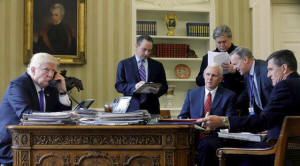|
Exclusive: In call with Putin, Trump
denounced Obama-era nuclear arms treaty - sources
 Send a link to a friend
Send a link to a friend
 [February 10, 2017]
By Jonathan Landay and David Rohde [February 10, 2017]
By Jonathan Landay and David Rohde
WASHINGTON (Reuters) - In his first call as
president with Russian leader Vladimir Putin, Donald Trump denounced a
treaty that caps U.S. and Russian deployment of nuclear warheads as a
bad deal for the United States, according to two U.S. officials and one
former U.S. official with knowledge of the call.
When Putin raised the possibility of extending the 2010 treaty, known as
New START, Trump paused to ask his aides in an aside what the treaty
was, these sources said.
Trump then told Putin the treaty was one of several bad deals negotiated
by the Obama administration, saying that New START favored Russia. Trump
also talked about his own popularity, the sources said.
The White House declined to comment on the details of the call. White
House spokesman Sean Spicer said Trump knew what the New START treaty is
but had turned to his aides for an opinion during the call with Putin.
He said the notes from the call would not have conveyed that.
"I would say they had a very productive call," Spicer told reporters. He
added, "It wasn't like he didn’t know what was being said. He wanted an
opinion on something."
It has not been previously reported that Trump had conveyed his doubt
about New START to Putin in the hour-long call.
New START gives both countries until February 2018 to reduce their
deployed strategic nuclear warheads to no more than 1,550, the lowest
level in decades. It also limits deployed land- and submarine-based
missiles and nuclear-capable bombers.

During a debate in the 2016 presidential election, Trump said Russia had
"outsmarted" the United States with the treaty, which he called
"START-Up." He asserted incorrectly then that it had allowed Russia to
continue to produce nuclear warheads while the United States could not.
Two Democratic members of the Senate Foreign Relations Committee,
senators Jeanne Shaheen and Edward J. Markey, criticized Trump for
deriding what they called a key nuclear arms control accord.
“It’s impossible to overstate the negligence of the president of the
United States not knowing basic facts about nuclear policy and arms
control,” Shaheen said in a statement. "New START has unquestionably
made our country safer, an opinion widely shared by national security
experts on both sides of the aisle."
Daryl Kimball, the executive director of the Arms Control Association, a
Washington-based advocacy group, said: "Unfortunately, Mr. Trump appears
to be clueless about the value of this key nuclear risk reduction treaty
and the unique dangers of nuclear weapons."
Secretary of State Rex Tillerson said he supported the treaty during his
Senate confirmation hearings.
During the hearings Tillerson said it was important for the United
States to "stay engaged with Russia, hold them accountable to
commitments made under the New START and also ensure our accountability
as well."
Two of the people who described the conversation were briefed by current
administration officials who read detailed notes taken during the call.
One of the two was shown portions of the notes. A third source was also
briefed on the call.
[to top of second column] |

U.S. President Donald Trump (L-R), joined by Chief of Staff Reince
Priebus, Vice President Mike Pence, senior advisor Steve Bannon,
Communications Director Sean Spicer and National Security Advisor
Michael Flynn, speaks by phone with Russia's President Vladimir
Putin in the Oval Office at the White House in Washington, U.S.
January 28, 2017. REUTERS/Jonathan Ernst

Reuters has not reviewed the notes taken of the call, which are
classified.
The Kremlin did not immediately respond to requests for comment.
CONCERNS OVER PHONE CALLS
The phone call with Putin has added to concerns that Trump is not
adequately prepared for discussions with foreign leaders.
Typically, before a telephone call with a foreign leader, a
president receives a written in-depth briefing paper drafted by
National Security Council staff after consultations with the
relevant agencies, including the State Department, Pentagon and
intelligence agencies, two former senior officials said.
Just before the call, the president also usually receives an oral
"pre-briefing" from his national security adviser and top
subject-matter aide, they said.
Trump did not receive a briefing from Russia experts with the NSC
and intelligence agencies before the Putin call, two of the sources
said. Reuters was unable to determine if Trump received a briefing
from his national security adviser Michael Flynn.
In the phone call, the Russian leader raised the possibility of
reviving talks on a range of disputes and suggested extending New
START, the sources said.
New START can be extended for another five years, beyond 2021, by
mutual agreement. Unless they agree to do that or negotiate new
cuts, the world's two biggest nuclear powers would be freed from the
treaty's limits, potentially setting the stage for a new arms race.
New START was ratified by the U.S. Senate in December 2010 by a vote
of 71 to 26. Thirteen Republican senators joined all of the Senate’s
Democrats in voting for the treaty, although Republican opponents
derided it as naive.
The call with Putin was one of several with foreign leaders where
Trump has turned to denounce deals negotiated by previous
administrations on trade, acceptance of refugees and arms control.

In a phone call with Australian Prime Minister Malcolm Turnbull,
Trump questioned an agreement reached by the Obama administration to
accept 1,250 refugees now being held by Australia in offshore
detention centers.
(Additional reporting by Arshad Mohammad and John Walcott; Editing
by John Walcott, Kevin Krolicki and Ross Colvin)
[© 2017 Thomson Reuters. All rights
reserved.]
Copyright 2017 Reuters. All rights reserved. This material may not be published,
broadcast, rewritten or redistributed. |